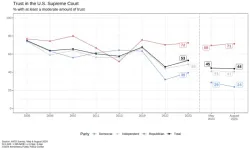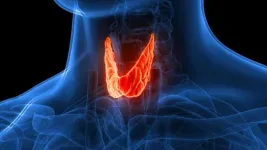(Press-News.org) A new paper, “Differences in misinformation sharing can lead to politically asymmetric sanctions,” published today in Nature suggests that the higher quantity of social media policy enforcement (such as account suspensions) for conservative users could be explained by the higher quantity of misinformation shared by those conservative users — and so does not constitute evidence of inherent biases in the policies from social media companies or in the definition of what constitutes misinformation.
Written by researchers from MIT Sloan School of Management, the University of Oxford, Cornell University, and Yale University, co-authors of the paper include Mohsen Mosleh, Qi Yang, Tauhid Zaman, Gordon Pennycook and David G. Rand.
The spread of misinformation has become an increasing concern, especially as the 2024 presidential election in the United States approaches. Many Americans who disagree on political issues agree that the sharing of false information is a substantial problem; sixty-five percent of Americans say that technology companies should take action to restrict the spread of false information. However, there is great dissension as to whether tech companies are actually moderating platforms fairly.
“Accusations of political bias are often based largely on anecdotes or noteworthy cases, such as the suspension from Twitter and Facebook of former President Trump,” said MIT Sloan professor Rand. “This study allows us to systematically evaluate the data and better understand the differential rates of policy enforcement.”
The asymmetry of conservative sanctions versus liberal sanctions should not be attributed to partisan bias on the part of social media companies and those determining what counts as misinformation, Rand and the co-authors noted.
The research began by looking at Twitter’s suspension of users following the 2020 U.S. presidential election. Researchers identified 100,000 Twitter users from October 2020 who shared hashtags related to the election, and randomly sampled 9,000 — half of whom shared at least one #VoteBidenHarris2020 hashtag and half of whom shared at least one #Trump2020 hashtag. Researchers analyzed each user’s data from the month before the election to quantify their tendency to share news from low-quality domains (as well as other potentially relevant characteristics), and then checked nine months later to determine which users were suspended by Twitter.
Accounts that had shared #Trump2020 before the election were 4.4 times more likely to have been subsequently suspended than those who shared #VoteBidenHarris2020. Only 4.5% of the users who shared Biden hashtags had been suspended as of July 2021, while 19.6% of the users who shared Trump hashtags had been suspended.
“We found that there were political differences in behavior, in addition to the political differences in enforcement,” said Rand. “The fact that the social media accounts of conservatives are suspended more than those of liberals is therefore not evidence of bias on the part of tech companies, and shouldn’t be used to pressure tech companies to abandon policies meant to reduce the sharing of misinformation.”
To better understand this difference, the researchers examined what content was shared by these politically active Twitter users in terms of the reliability of the sources through two different methods. They used a set of 60 news domains (the 20 highest volume sites within the categories of mainstream, hyper-partisan and fake news), and collected trustworthiness ratings for each domain from eight professional fact-checkers. In an effort to eliminate concern about potential bias on the part of journalists and fact-checkers, the researchers also collected ratings from politically-balanced groups of laypeople. Both approaches indicated that people who used Trump hashtags shared four times more links to low-quality news outlets than those who used Biden hashtags.
“Prior work identifying political differences in misinformation sharing has been criticized for relying on the judgment of professional fact-checkers. But we show that conservative Twitter users shared much lower quality news, even when relying on ratings from politically-balanced groups of laypeople,” said co-author Dr Mohsen Mosleh, Associate Professor, Oxford Internet Institute, part of the University of Oxford. “This can’t be written off as the result of political bias in the ratings, and means that preferential suspension of conservative users is not necessarily the result of political bias on the part of social media companies.”
The study also discovered similar associations between conservatism and low-quality news sharing (based on both expert and politically-balanced layperson ratings) were present in seven other datasets from Twitter, Facebook, and survey experiments, spanning 2016 to 2023 and including data from 16 different countries. For example, the researchers found cross-cultural evidence of conservatives sharing more unambiguously false claims about COVID-19 than liberals, with conservative political elites sharing links to lower quality new sources than liberal political elites in the U.K. and Germany as well.
“The social media users analyzed in this research are not representative of Americans more broadly, so these findings do not necessarily mean that conservatives in general are more likely to spread misinformation than liberals. Also, we’re just looking at this particular period in time,” said Rand. “Our basic point would be the same if it was found that liberal users shared more misinformation and were getting suspended more. Such a pattern of suspension would not be enough to show bias on the part of the companies, because of the differences in users’ behavior.”
Even under politically neutral anti-misinformation policies, the researchers expect that there would be political asymmetries in enforcement. While the analyses do not rule out the possibility of any bias on the part of platforms, the inequality of sanctions is not diagnostic of bias one way or the other. Policy-makers need to be aware that even if social media companies are working in an unbiased way to manage misinformation on their platforms, there will still be some level of differential treatment across groups.
END
Social media users’ actions, rather than biased policies, could drive differences in platform enforcement
New MIT Sloan research has found that politically conservative users tend to share misinformation at a greater volume than politically liberal users and this could explain why conservatives were suspended more frequently
2024-10-02
ELSE PRESS RELEASES FROM THIS DATE:
How a bacterium becomes a permanent resident in a fungus
2024-10-02
Endosymbiosis is a fascinating biological phenomenon in which an organism lives inside another. Such an unusual relationship is often beneficial for both parties. Even in our bodies, we find remnants of such cohabitation: mitochondria, the powerhouses of our cells, evolved from an ancient endosymbiosis. Long ago, bacteria entered other cells and stayed. This coexistence laid the foundation for mitochondria and thus the cells of plants, animals, and fungi.
What is still poorly understood, however, is how an endosymbiosis as a lifestyle actually arises. A bacterium that more or less accidentally ...
Study: For long COVID, lithium aspartate at low doses is ineffective, but higher doses may be promising
2024-10-02
BUFFALO, N.Y. — A small University at Buffalo clinical trial has found that at low doses, lithium aspartate is ineffective in treating the fatigue and brain fog that is often a persistent feature of long COVID; however, a supplemental dose-finding study found some evidence that higher doses may be effective.
Published in JAMA Network Open on Oct. 2, the study was led by Thomas J. Guttuso, Jr., MD, professor of neurology in the Jacobs School of Medicine and Biomedical Sciences at UB and a physician with UBMD Neurology.
“It’s a negative study with a positive twist,” Guttuso concludes.
Because ...
Online insomnia treatment can help caregivers get much-needed rest, study suggests
2024-10-02
Providing care for a family member with a disabling illness can be a demanding job that leaves many people unable to sleep, but an online insomnia treatment developed at the University of Virginia School of Medicine can help, new research shows.
Not only did the SHUTi (Sleep Healthy Using the Internet) sleep intervention help caregivers get better rest, it most benefited those shouldering the greatest responsibilities in caring for their loved ones, the researchers found.
The results suggest the online format of the program ...
Attivare licenses Wyss Institute’s immune-modulating biomaterial technology to advance immunotherapies
2024-10-02
Attivare licenses Wyss Institute’s immune-modulating biomaterial technology to advance immunotherapies
The company is developing the biomaterial-based technology to develop novel therapies able to program anti-cancer immunity and prevent infectious diseases
By Benjamin Boettner
(BOSTON) — Today, the Wyss Institute for Biologically Inspired Engineering at Harvard University and Attivare Therapeutics Inc. announced that Attivare has licensed a portfolio of immune-modulating biomaterial technologies from Harvard University that was created at the ...
Regenstrief, Fairbanks researcher among 25 fellows to be inducted into American College of Medical Informatics
2024-10-02
The American College of Medical Informatics (ACMI) has announced that Chris Harle, PhD, of the Indiana University Richard M. Fairbanks School of Public Health and the Regenstrief Institute will be inducted as one of 25 new fellows on November 10 in San Francisco, CA, at ceremonies during the American Medical Informatics Association (AMIA) 2024 Annual Symposium.
ACMI is a college of elected fellows who have made significant and sustained contributions to the field of biomedical informatics. Individuals who have achieved national recognition in the field and are committed to advancing ...
Ontario Institute for Cancer Research funding aims to speed the development of new drugs for some of the most common cancers
2024-10-02
October 2, 2024, TORONTO – The Ontario Institute for Cancer Research (OICR) continues to support Ontario drug discovery research by funding high-quality investigations of new therapies for some of the most prevalent pediatric and adult cancers. These projects are tackling substantial challenges in cancer by increasing the effectiveness and availability of immunotherapies, making cancer more vulnerable to chemotherapy and developing a new drug for one of the deadliest forms of childhood brain cancer.
OICR’s Cancer Therapeutics Innovation Pipeline (CTIP) initiative is supporting three research teams ...
Trust in US Supreme Court continues to sink
2024-10-02
PHILADELPHIA – Driven by political partisanship, public trust in the U.S. Supreme Court has continued a downward slide since the court’s 2022 Dobbs decision overturning the Roe v. Wade ruling that established a constitutional right to abortion, according to a new survey by the Annenberg Public Policy Center (APPC) of the University of Pennsylvania.
More than half of Americans (56%) now disapprove of the Supreme Court, saying they trust it either “a little” or “not at all” to act in the best interest ...
Rice’s Biotech Launch Pad to lead commercialization of bioelectrical implant treatment for obesity, type 2 diabetes
2024-10-02
Rice University is part of a multiuniversity research team that has secured an award of up to $34.9 million from the Advanced Research Projects Agency for Health (ARPA-H) to accelerate the development of a bioelectronic implant designed to improve adherence for obesity and type 2 diabetes (T2D) treatment while reducing development and manufacturing costs.
Rice University’s Biotech Launch Pad will lead the commercialization effort for “Rx On-site Generation Using Electronics” (ROGUE), a self-contained, durable implantable device that houses cells engineered ...
Carnegie Mellon to lead development of implantable cell-based bioelectronic devices for patient-specific treatment and disease monitoring
2024-10-02
PITTSBURGH – A Carnegie Mellon University-led team has secured an award of up to $42 million from the Advanced Research Projects Agency for Health (ARPA-H) to accelerate the development of implantable, cell-based bioelectronic devices that deliver patient-specific therapy and monitor disease status, for conditions like hypo- and hyperthyroidism, in real time. This award is part of the ARPA-H REACT program, which supports the advancement of implantable bioelectronic devices to improve patient management of chronic diseases.
Burak ...
Case Western Reserve, Vanderbilt universities to develop incisionless prostate surgery using MRI and robotics
2024-10-02
CLEVELAND—Researchers at Case Western Reserve University and Vanderbilt University are pioneering a new approach to prostate cancer surgery by combining advanced robotics and “low-field” MRI technology.
The research aims to allow highly accurate, patient-tailored prostate cancer surgeries without the need for traditional incisions. This innovative research marks a major step in developing minimally invasive treatments for prostate cancer, with the potential to improve both safety and efficiency for patients.
The project is being funded by a new five-year, $3.7 million grant from the National Cancer Institute, part of the ...
LAST 30 PRESS RELEASES:
ASU researchers to lead AAAS panel on water insecurity in the United States
ASU professor Anne Stone to present at AAAS Conference in Phoenix on ancient origins of modern disease
Proposals for exploring viruses and skin as the next experimental quantum frontiers share US$30,000 science award
ASU researchers showcase scalable tech solutions for older adults living alone with cognitive decline at AAAS 2026
Scientists identify smooth regional trends in fruit fly survival strategies
Antipathy toward snakes? Your parents likely talked you into that at an early age
Sylvester Cancer Tip Sheet for Feb. 2026
Online exposure to medical misinformation concentrated among older adults
Telehealth improves access to genetic services for adult survivors of childhood cancers
Outdated mortality benchmarks risk missing early signs of famine and delay recognizing mass starvation
Newly discovered bacterium converts carbon dioxide into chemicals using electricity
Flipping and reversing mini-proteins could improve disease treatment
Scientists reveal major hidden source of atmospheric nitrogen pollution in fragile lake basin
Biochar emerges as a powerful tool for soil carbon neutrality and climate mitigation
Tiny cell messengers show big promise for safer protein and gene delivery
AMS releases statement regarding the decision to rescind EPA’s 2009 Endangerment Finding
Parents’ alcohol and drug use influences their children’s consumption, research shows
Modular assembly of chiral nitrogen-bridged rings achieved by palladium-catalyzed diastereoselective and enantioselective cascade cyclization reactions
Promoting civic engagement
AMS Science Preview: Hurricane slowdown, school snow days
Deforestation in the Amazon raises the surface temperature by 3 °C during the dry season
Model more accurately maps the impact of frost on corn crops
How did humans develop sharp vision? Lab-grown retinas show likely answer
Sour grapes? Taste, experience of sour foods depends on individual consumer
At AAAS, professor Krystal Tsosie argues the future of science must be Indigenous-led
From the lab to the living room: Decoding Parkinson’s patients movements in the real world
Research advances in porous materials, as highlighted in the 2025 Nobel Prize in Chemistry
Sally C. Morton, executive vice president of ASU Knowledge Enterprise, presents a bold and practical framework for moving research from discovery to real-world impact
Biochemical parameters in patients with diabetic nephropathy versus individuals with diabetes alone, non-diabetic nephropathy, and healthy controls
Muscular strength and mortality in women ages 63 to 99
[Press-News.org] Social media users’ actions, rather than biased policies, could drive differences in platform enforcementNew MIT Sloan research has found that politically conservative users tend to share misinformation at a greater volume than politically liberal users and this could explain why conservatives were suspended more frequently





